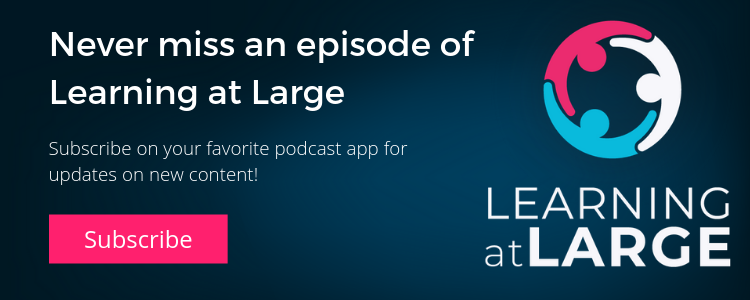Why learning needs to be organizational
Organizational learning isn’t just a nice idea – it’s essential to staying resilient, productive, and people-centered. But what does it really look like in action? In this podcast episode, we’re joined by Dr. Nigel Paine, a learning and leadership expert, to explore how organizations can shift away from individual performance and toward collective learning. Nigel shares his vision for learning cultures built on trust, team connection, and the “organizational brain”.
Watch the full podcast video
Top tips for creating a culture of collective learning
Don’t have time to listen now? Here’s a quick summary of what you’ll learn in this episode:
- Shift the focus from individual to collective learning – Organizations often invest in individuals but fail to retain knowledge when those individuals leave.
- Build your organizational brain – Learning happens in the space between people. Encourage connection and collaboration to grow shared intelligence.
- Remove fear from the workplace – A psychologically safe environment is key to encouraging questions, feedback, and collaborative problem-solving.
- Treat learning as a team sport – True learning organizations value teams over individuals and use collaboration to solve problems and build skills.
- Demonstrate the business value of learning culture – From higher productivity to transformation readiness, the benefits are tangible.
- Embrace skills-based thinking over rigid job roles – Break away from job descriptions and empower teams to flex and develop the skills they really need.
1. Shift the focus from individual to collective learning
Organizations that focus too heavily on individual talent risk losing valuable knowledge when people move on. Nigel encourages leaders to embed learning into the organization itself – creating systems that support shared understanding and knowledge continuity. By shifting focus from individual success to collective growth, organizations become more resilient and adaptable.
“We are focusing far, far too much on individuals… and we have defocused on the collective, the way people work together, and therefore we defocus on the organization.”
2. Build your organizational brain
An organization becomes smarter when its people are well-connected. Nigel uses the “organizational brain” to describe shared learning that happens between people – not just within them. Like neurons in the brain, strong internal connections help teams share insights, collaborate effectively, and adapt quickly. The more connected your people are, the more intelligent and agile your organization becomes.
“You are smart not because of the number of neurons you have, but because of the connections… it’s the connections that matter.”
3. Remove fear from the workplace
Fear holds people back from learning and collaborating. Nigel stresses that psychological safety is essential – people need to feel secure enough to ask for help, admit mistakes, and take risks. When fear is removed, trust grows, and teams are empowered to solve problems together.
“You cannot learn if you’re frightened. You cannot learn if you think you’re going to be humiliated, and you cannot learn if you think you’re going to get the sack.”
4. Treat learning as a team sport
Learning thrives in teams. When people learn together, they solve problems more effectively, share strengths, and build stronger team cultures. Peer learning and communities of practice play a key role in making learning a shared responsibility.
“The bottom unit of productivity is a team. Not an individual. You’ve got to accept that there are team challenges, team objectives, team bonuses, and not focus on the individuals.”
5. Demonstrate the business value of learning culture
A strong learning culture drives business performance. Nigel explains that when learning is embedded into everyday work, productivity, resilience, and transformation readiness all improve. L&D must link learning initiatives clearly to these outcomes.
“If you create a learning culture in your organization, you’ll have more productivity, more resilience, and you’ll be able to transform faster and more efficiently.”
6. Embrace skills-based thinking over rigid job roles
Rigid job descriptions limit growth. Nigel promotes a skills-first mindset, where teams are empowered to develop new capabilities as needs evolve. This agility helps organizations stay responsive and future-ready.
“If you want a skills-based organization, you’ve got to split the size of the toothpaste tube and let the toothpaste run out.”
About Nigel
Nigel is a leading thinker on leadership, learning, and organizational development. A former Head of Learning at the BBC, he now works with organizations around the world to promote positive change and build stronger learning cultures. He is the author of multiple books, including The Great Reset, and co-hosts the Learning Now TV channel.
Connect with Nigel on LinkedIn.
Want more learning insights?
Stay ahead with the latest tips, expert learnings, and best practices from top learning managers and global leaders – delivered straight to your inbox. The Learning at Large newsletter brings you insider content each month to help you create, manage, and deliver engaging learning at scale.
Subscribe now and never miss an edition!
Enjoyed the podcast? Don’t forget to rate it in your favorite podcast app. Thanks for tuning in – we’ll see you next time!
